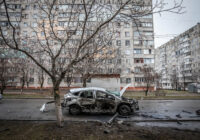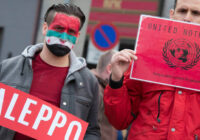As the city burns, we must not forget that Aleppo was once a place of history, culture and diversity.
In summer 2009, I embarked on one of the most amazing journeys of my life: a road trip from Istanbul to Damascus, roughly 1,500 kilometers.
The journey took me to various Turkish cities, including Izmir, Antalya, Adana and the famous Gaziantep. From there we took a taxi to cross the Turkish-Syrian border.
At the border, I went to the immigration officer and handed him my passport. At that time, the Syrian Arab Republic had a visa-free policy for citizens of Arab countries.
When I reached passport control, the police officer took my passport, looked at it in a weird way and started shouting, “Did you visit the enemy?”
He looked at the stamps and visas of various European and North American countries. He kept asking, “Did you visit the enemy?” about three or four times. I then realized he was asking if I had been to “Israel,” to which I said no.
At the end of the ordeal, I was welcomed to the “Land of Sham,” or the Levant.
History on Every Corner
My first encounter with Syria was the beautiful city of Aleppo, one of the oldest, continuously inhabited cities in the world. My visit to Aleppo was one of the most insightful trips I have ever made. Being in Aleppo made you feel like history was on every corner, with joyful people of various religions, ethnicities and tribes all walking and sitting side by side.
The first person I met was a blonde woman with green eyes. I spoke to her in Arabic, but she replied in a foreign tongue. I thought, “But this is Syria, the land of Arabic.” Then I discovered that I was in Jdeideh, Aleppo, a neighborhood where people still speak Aramaic, a version of the language spoken by Jesus.
What struck me the most was how poor but gentle people were. I have never felt such hospitality and yet chivalry from anyone until I walked the streets of Aleppo and talked to its people. At that time, everything was blocked by the regime—Facebook, YouTube—so you had to use a VPN to log on to almost everything.
At one point, I went to an internet cafe (yes, when those still existed) and the owner asked for my passport. I couldn’t stop myself and started laughing. “Why on earth do you need my passport?” I said. He then kept asking me aggressively before I reluctantly refused to hand it to him, stating that it was the first time ever that someone had made such a request to me.
A few minutes later, I was taken to an “office” that I later discovered was a type of “police” section, or as it is called in Arabic, Amn al-Dawla (Security of the State).
The person in front of me started shouting again and used that famous “enemy” line. He said something about how I as a Moroccan didn’t understand the security concerns of Syria, and how it was very important to check the identification of anyone entering an internet café or even trying to access an all-blocked internet (remember, we were still in 2009).
I stayed in Aleppo for around four days, where I enjoyed the taste of the food, the hospitality of its people, the warmth of its walls and the richness of its culture, while living in a diverse city that you would rarely see anywhere else in the world
Back then, you could see dozens of churches and mosques built side by side, and women wearing the cross and others with a hijab (headscarf) or not, all mingling. I remember thinking that these people had been living together for centuries and learned to live in the same shared space.
Walking the streets of Aleppo and then Damascus, I had never felt as pressured as I did. Wherever you went, you would feel that someone was watching—even the taxi driver stopped you taking photos. At that time, I realized how the Syrian regime was “pushing everyone down” to serve itself, making the people extremely poor while looking after its own interests.
Distance Dreams
Fast-forward to 2011 and beyond: I have always supported the Syrian people against the Assad regime—a cruel dictatorship that puts to shame any government that claims to represent its people and even more so to claim it is “democratic.”
 Now, as Aleppo burns amid muted global condemnation, nothing is left in Syria except hope that, one day, the millions left inside the country and all those who have fled find a better life and a better future.
Now, as Aleppo burns amid muted global condemnation, nothing is left in Syria except hope that, one day, the millions left inside the country and all those who have fled find a better life and a better future.
There is no such thing as “casualties of war” or “collateral damage.” A life is a life and all lives matter.
*[Author’s note: I am not a political analyst, an expert on foreign affairs or even conflicts. I am just a traveler who enjoys people and stories wherever they are, and I happen to get in trouble very often.]
The views expressed in this article are the author’s own and do not necessarily reflect Fair Observer’s editorial policy.
Photo Credit: Adwo / Vodograj / Shutterstock.com
Support Fair Observer
We rely on your support for our independence, diversity and quality.
For more than 10 years, Fair Observer has been free, fair and independent. No billionaire owns us, no advertisers control us. We are a reader-supported nonprofit. Unlike many other publications, we keep our content free for readers regardless of where they live or whether they can afford to pay. We have no paywalls and no ads.
In the post-truth era of fake news, echo chambers and filter bubbles, we publish a plurality of perspectives from around the world. Anyone can publish with us, but everyone goes through a rigorous editorial process. So, you get fact-checked, well-reasoned content instead of noise.
We publish 2,500+ voices from 90+ countries. We also conduct education and training programs
on subjects ranging from digital media and journalism to writing and critical thinking. This
doesn’t come cheap. Servers, editors, trainers and web developers cost
money.
Please consider supporting us on a regular basis as a recurring donor or a
sustaining member.
Will you support FO’s journalism?
We rely on your support for our independence, diversity and quality.







